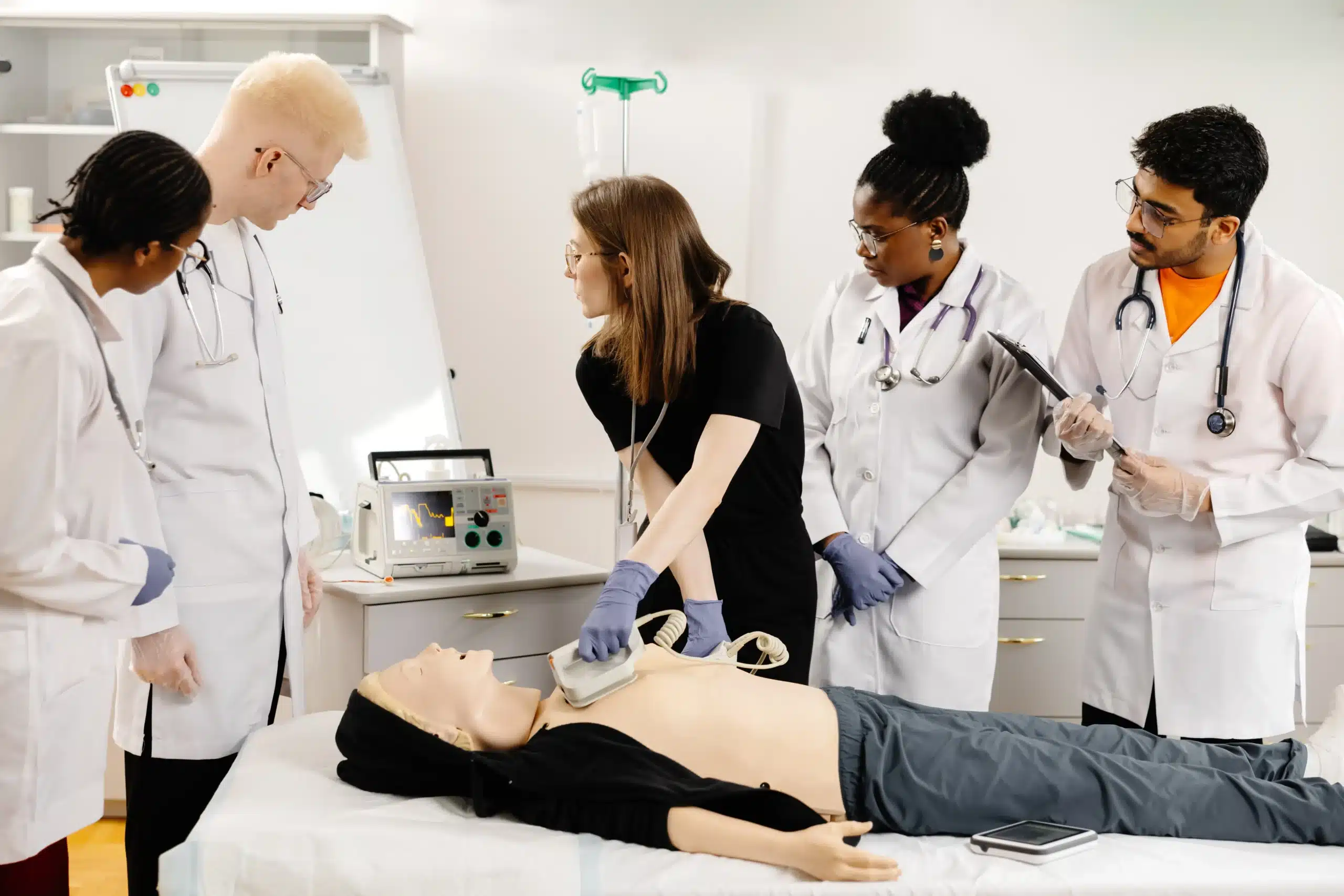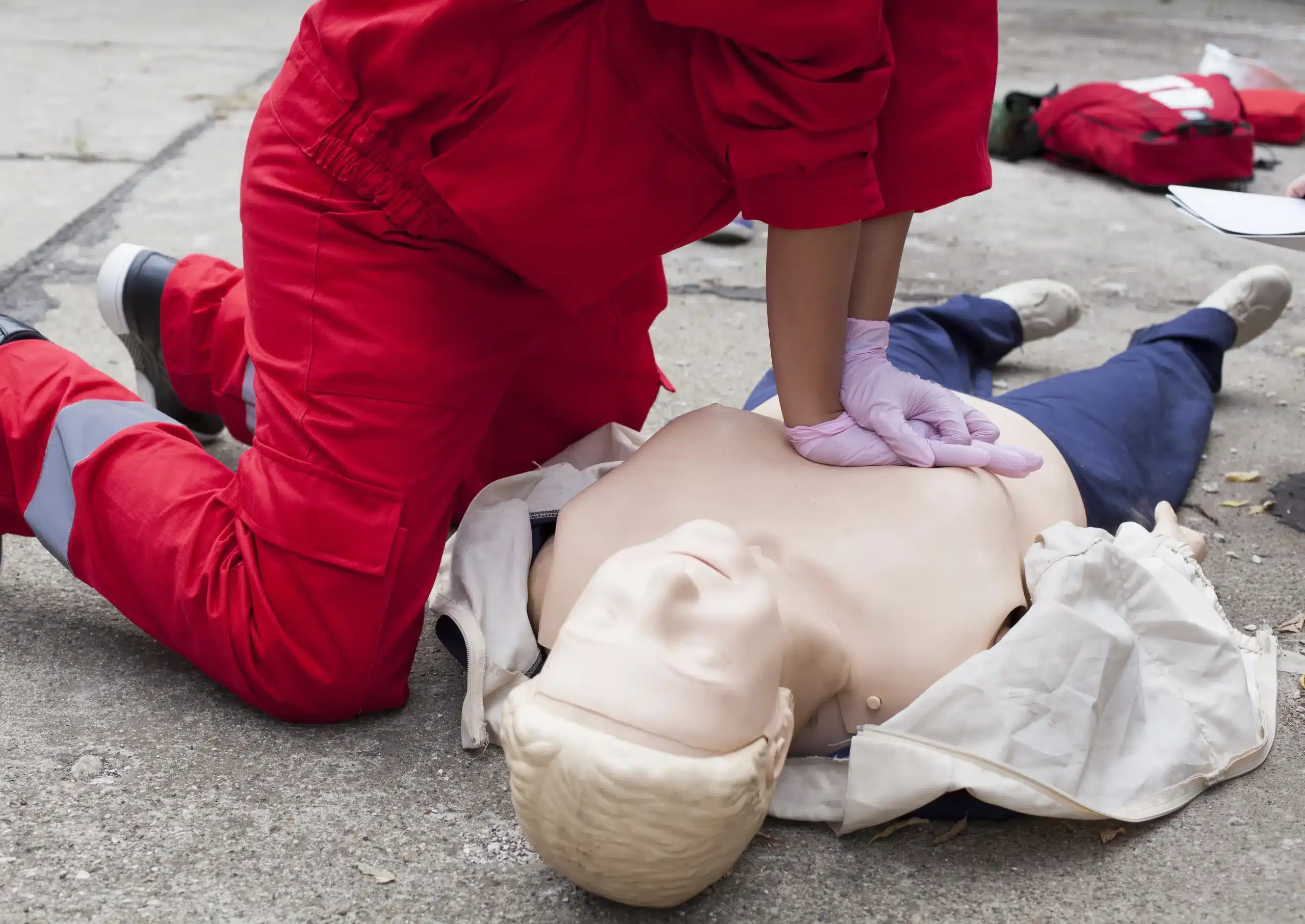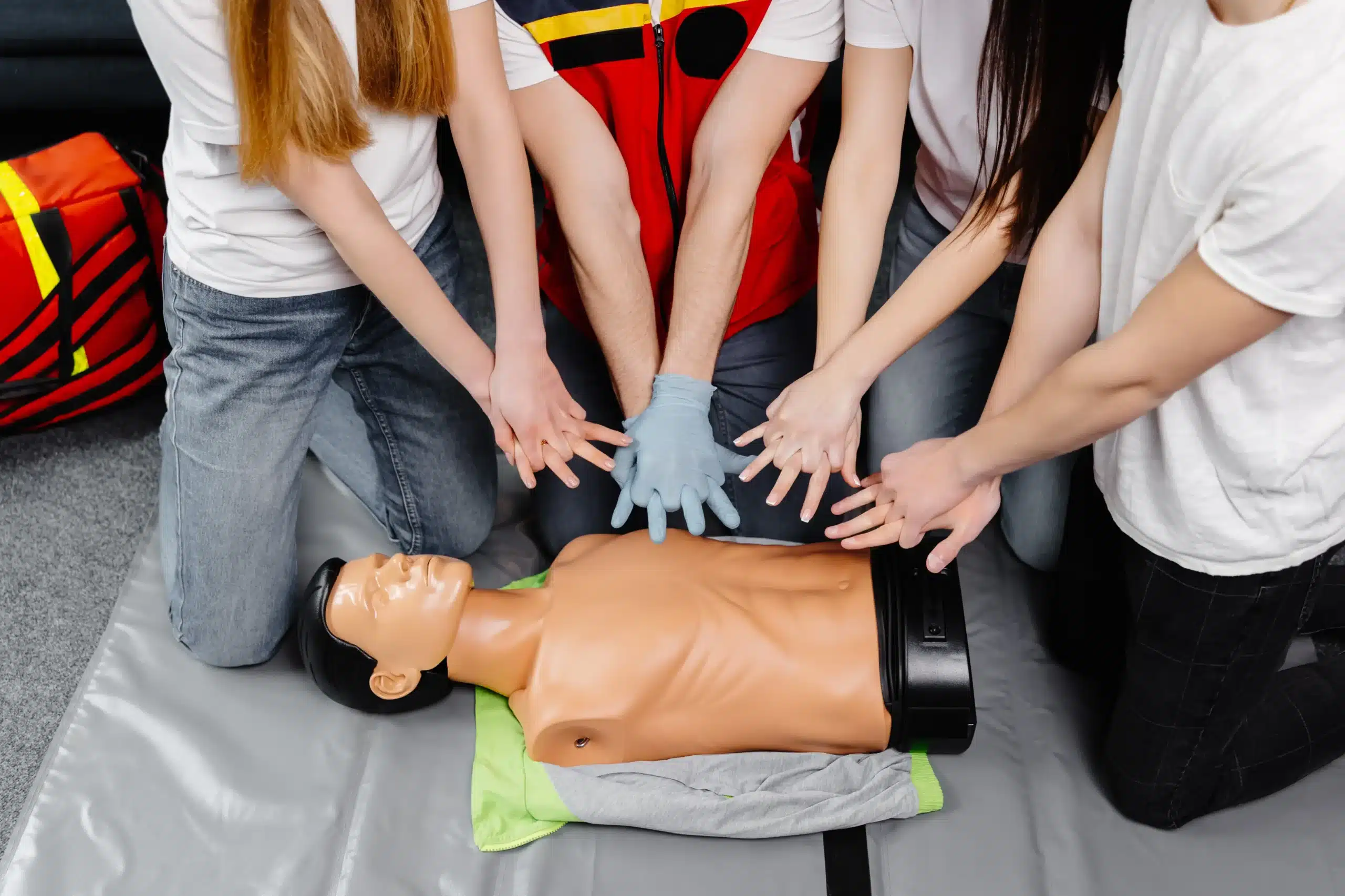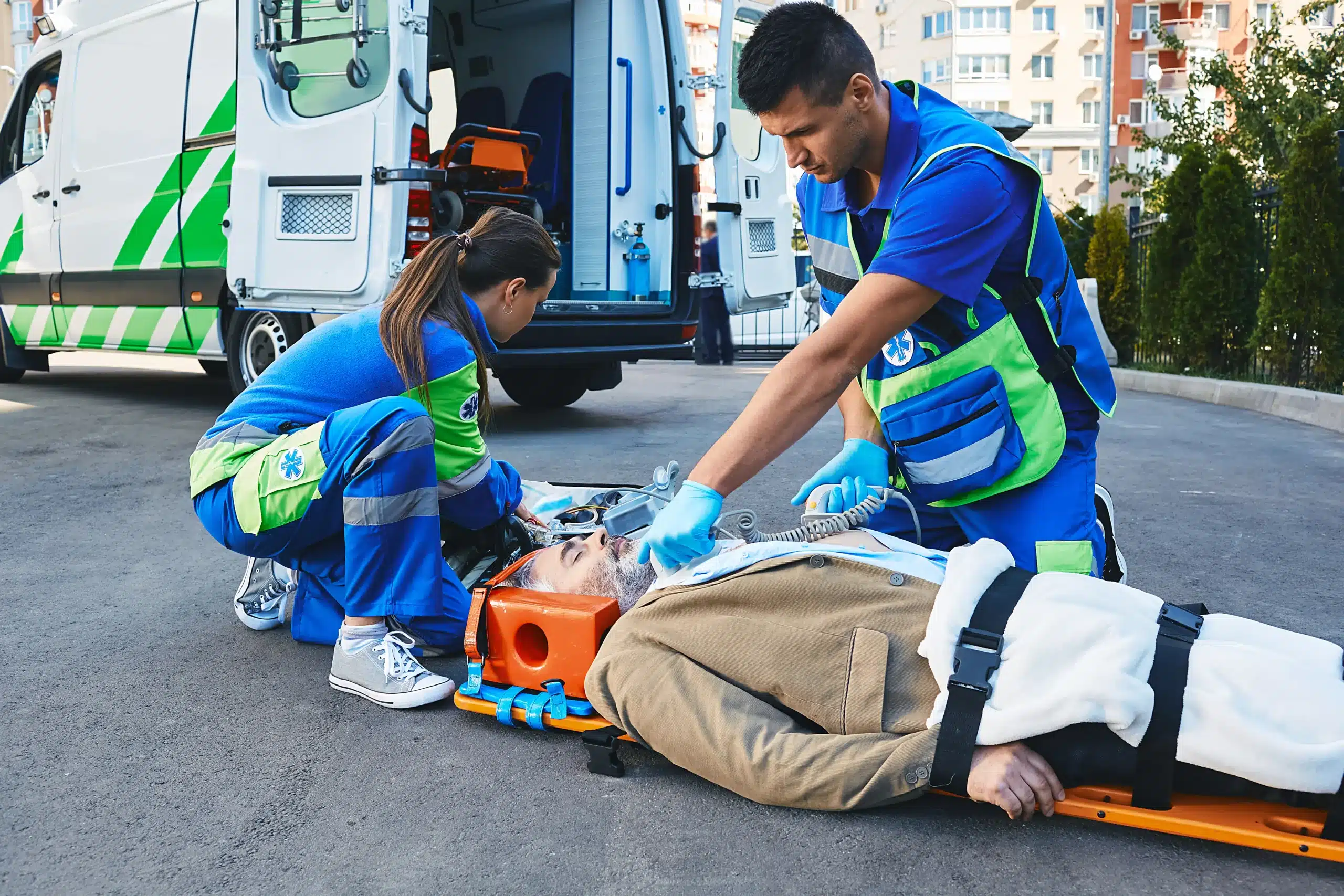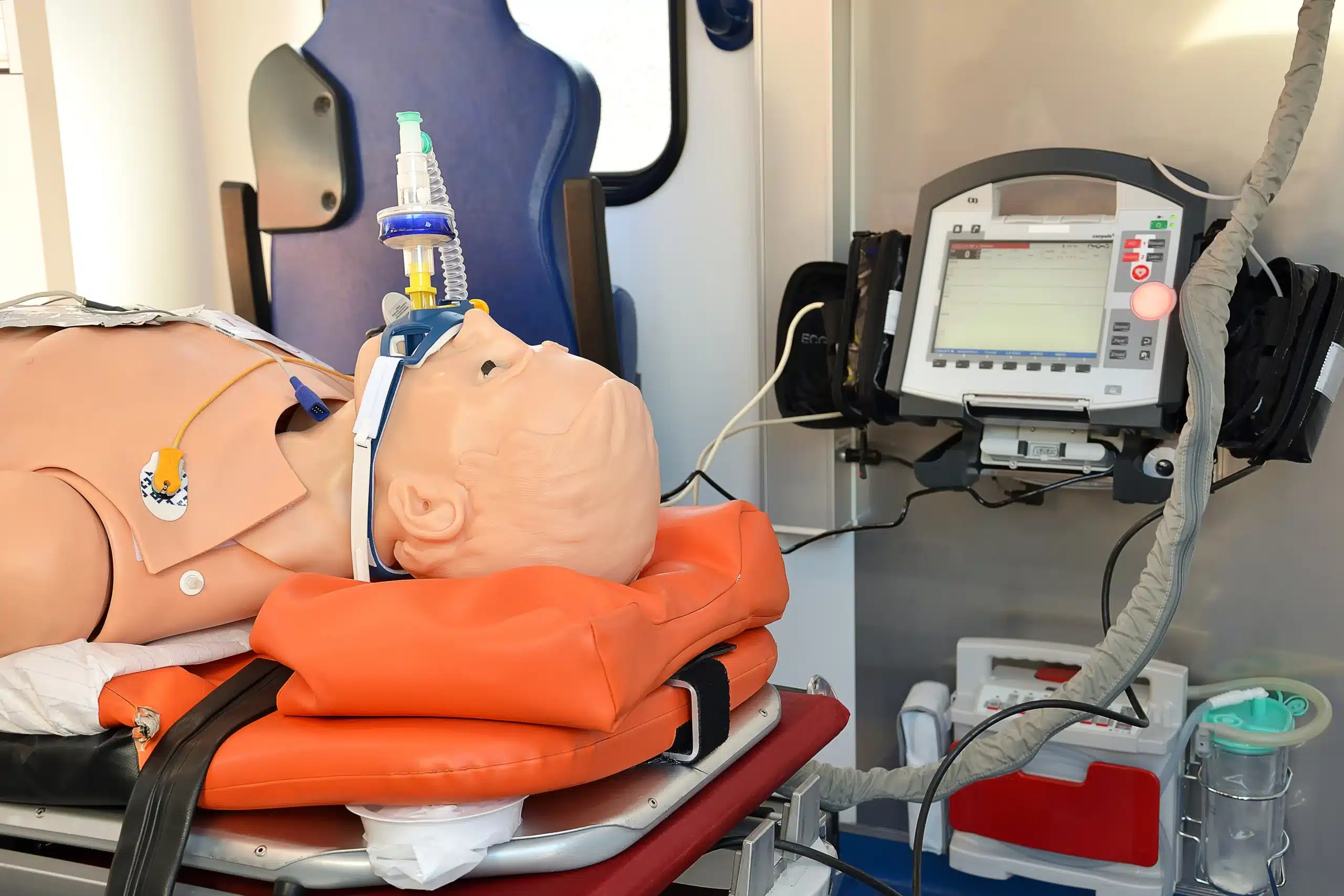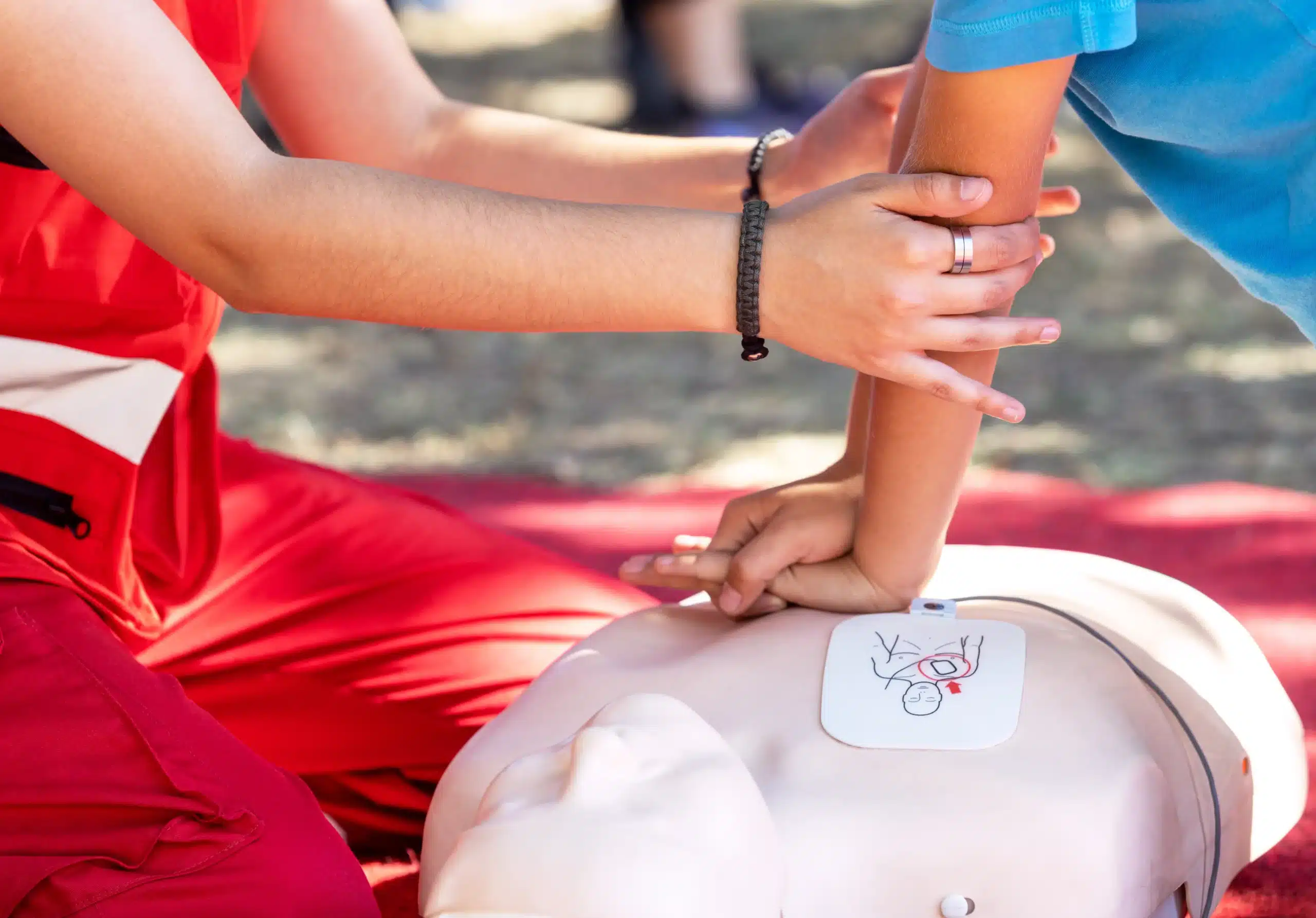Juggling a busy schedule while staying up-to-date with essential certifications can be challenging for healthcare professionals. That’s where the flexibility of PALS HeartCode in Stockton comes in. This blended learning program combines the convenience of online coursework with the crucial hands-on skills practice needed to confidently manage pediatric emergencies. Whether you’re a seasoned healthcare provider or just starting your career, this comprehensive guide will walk you through the benefits of PALS HeartCode training in Stockton, the certification process, and how to choose the right training provider for your needs. We’ll also debunk some common misconceptions about online certifications and highlight the importance of this specialized training in improving patient outcomes.
Key Takeaways
- HeartCode PALS fits your schedule: The blended learning format combines online modules with a hands-on skills session, allowing you to learn at your own pace and complete the coursework when it’s convenient.
- Finding the right provider is key: Consider factors like cost, instructor experience, and scheduling flexibility when choosing a HeartCode PALS course. Ask about class sizes and what’s included in the total price to make an informed decision.
- PALS certification enhances your skills and career: This valuable credential demonstrates your commitment to providing high-quality pediatric care and can open doors to new opportunities in the healthcare field.
What is HeartCode PALS?
HeartCode PALS is a blended learning program that combines online coursework with a hands-on skills session. This approach allows healthcare providers to learn the essentials of Pediatric Advanced Life Support (PALS) at their own pace online, before demonstrating their skills in person. It’s a flexible way to fit this essential training into a busy schedule.
Blended Learning Explained
HeartCode PALS uses blended learning, meaning you’ll experience a mix of online learning and hands-on practice. This flexible format lets you move through the online modules at your own speed and then apply your knowledge in a practical skills session. The online portion uses interactive scenarios and simulations to reinforce learning, while the in-person skills check ensures you can perform essential techniques correctly. This combination of online and in-person training creates a well-rounded learning experience.
Key Features and Benefits
The HeartCode PALS course equips healthcare providers with the knowledge and skills to manage pediatric emergencies effectively. The program covers a wide range of topics, from basic life support to advanced airway management and treatment of cardiac arrhythmias. Upon completion of both the online portion and the hands-on skills session with an AHA Instructor, you’ll receive your PALS certification. This comprehensive training provides healthcare professionals with the confidence to respond effectively in critical situations.
HeartCode PALS vs. Traditional PALS
While both HeartCode PALS and traditional PALS courses lead to the same certification, they differ in their delivery methods. Traditional PALS courses typically involve in-person lectures and demonstrations, while HeartCode PALS offers the flexibility of online learning. It’s important to note that both options require an in-person skills check to ensure competency. Choosing between the two often comes down to learning style and scheduling preferences. While basic CPR training is valuable, it doesn’t replace the specialized knowledge and skills gained through PALS certification, especially when responding to pediatric emergencies. PALS goes beyond basic life support (BLS) to address the unique needs of infants and children. This specialized training is crucial for anyone regularly working with young patients.
HeartCode PALS: Course Structure and Duration
HeartCode PALS is a blended learning program, combining online coursework with a hands-on skills session. This approach lets you learn at your own speed before demonstrating your skills in person. Let’s take a closer look at each component:
Online Component
The online portion covers the core PALS curriculum through interactive modules, case studies, and simulations. This self-directed learning lets you focus on areas where you need extra practice and review material as often as you need. Access the online modules from any computer or mobile device with an internet connection, offering plenty of flexibility.
Hands-On Skills Session
After completing the online portion, you’ll attend a hands-on skills session with a certified PALS instructor. This session typically takes about five hours, including breaks. You’ll practice essential skills like CPR, airway management, and vascular access on infant and child manikins. The instructor will provide feedback and guidance, helping you perfect your technique and prepare for real-life emergencies. The American Heart Association offers more information on PALS course options.
Time Commitment and Flexibility
One of the biggest advantages of HeartCode PALS is its flexibility. The blended learning format allows you to complete the online modules at your own pace, fitting the training around your schedule. Once you’ve finished online, you can schedule your hands-on skills session at a convenient time. This makes HeartCode PALS a practical option for busy healthcare professionals. This HeartCode PALS guide offers helpful tips for online certification.
How Much Does HeartCode PALS Cost in Stockton?
Understanding the cost of PALS certification is an important step. Let’s break down the expenses associated with HeartCode PALS certification in Stockton.
Online Course Fees
The online portion of the HeartCode PALS course through Tracy CPR Classes is included in the total program cost of $290. This covers everything: the online modules, the in-person skills session, and your official American Heart Association certification card. This comprehensive pricing ensures a streamlined process. For more details about our programs, visit our BLS course page.
Skills Session Costs
While the skills session is included in the overall $290 fee, it’s helpful to understand the time commitment. The hands-on skills session typically lasts about five hours, including short breaks. This allows you to practice the skills you learned online with a certified instructor. The American Heart Association offers more information on PALS course options.
Additional Costs
It’s important to be aware of potential additional costs you might encounter with other providers or for different courses. Prices for certifications like BLS or ACLS can vary. For example, a basic BLS course might cost $65, while an ACLS course could be $200. RCPALS offers a pricing comparison for various courses. However, with Tracy CPR Classes, the $290 for HeartCode PALS covers everything, so you can avoid unexpected expenses.
Where to Find HeartCode PALS Courses in Stockton
Finding the right HeartCode PALS course in Stockton is easier than you think. Several reputable providers offer this blended learning program, combining online coursework with essential hands-on training. Here are a few options to explore:
Tracy CPR Classes
Tracy CPR Classes offers a blended learning approach to Pediatric Advanced Life Support training, equipping you with the skills to confidently manage pediatric emergencies. The PALS HeartCode program combines online coursework with a hands-on skills session, allowing healthcare providers to learn at their own pace before demonstrating their skills in person. This flexible format makes it easier to fit the training into your busy schedule. Tracy CPR Classes serves Stockton, Tracy, and Lodi.
Healthcare Learning Center
The Healthcare Learning Center (HLC) in Stockton provides affordable American Heart Association (AHA) CPR certification classes, including BLS, ACLS, and PALS certifications. HLC focuses on offering high-quality training for healthcare professionals. Check their website for course schedules and pricing.
Safety Training Seminars
Safety Training Seminars offers AHA-certified CPR, BLS, ACLS, and PALS classes in Stockton and surrounding areas. They provide classes daily, a convenient option for busy healthcare providers seeking certification. This frequent availability can help you get certified quickly.
RCPALS
RCPALS specializes in AHA courses, including Basic Life Support (BLS), Advanced Cardiac Life Support (ACLS), Pediatric Advanced Life Support (PALS), and Neonatal Resuscitation Program (NRP) courses. This ensures comprehensive training options for healthcare professionals looking to expand their skillset. They offer a range of courses to meet various needs.
American Heart Association Training Centers
The American Heart Association (AHA) website is a valuable resource for locating certified training centers. HeartCode PALS is the AHA’s blended learning method for PALS certification, combining online learning with hands-on practice. This offers flexibility and a personalized learning experience. You can use the AHA website to locate approved training centers offering HeartCode PALS in Stockton.
Benefits of HeartCode PALS for Healthcare Professionals
Enhance Your Pediatric Emergency Response Skills
HeartCode PALS equips healthcare providers with the knowledge and skills to confidently manage pediatric emergencies. This blended learning format combines online coursework with a hands-on skills session, ensuring you develop both the theoretical knowledge and practical skills to respond effectively. The online portion allows you to learn at your own pace, while the in-person skills session reinforces your learning through realistic simulations and practice. This comprehensive approach builds confidence and competence in managing real-life pediatric emergencies.
Advance Your Career
Earning your PALS certification can significantly advance your healthcare career. Many healthcare facilities require PALS certification for specific roles, demonstrating a commitment to providing high-quality pediatric care. PALS certification can open doors to new opportunities, increase your earning potential, and enhance your professional credibility. It also shows your dedication to continuous learning and professional development, making you a more valuable asset to any healthcare team.
Improve Patient Outcomes
Ultimately, the goal of PALS certification is to improve outcomes for pediatric patients. By preparing healthcare providers to effectively recognize and intervene in patients experiencing respiratory emergencies, shock, and cardiopulmonary arrest, PALS directly contributes to better patient care. The PALS Provider Course focuses on evidence-based practices and emphasizes early intervention, which can significantly impact a child’s chances of survival and recovery. Having the skills to recognize and respond to life-threatening emergencies involving children and infants leads to more positive patient outcomes.
Prepare for Your HeartCode PALS Certification
Getting ready for your HeartCode PALS certification involves understanding the process, gathering necessary materials, and preparing for the exam. This blended learning approach combines online coursework with a hands-on skills session, offering flexibility and a comprehensive learning experience. Let’s break down how to prepare:
Required Materials and Equipment
For the online portion of HeartCode PALS, you’ll primarily need a computer with reliable internet access and speakers or headphones. The beauty of this part of the course is its adaptability. The program uses your responses and self-assessed confidence levels to create a personalized learning path, focusing on areas where you need the most practice. Keep your favorite note-taking materials handy, whether digital or traditional pen and paper.
The hands-on skills session requires different equipment. This in-person portion allows you to apply the knowledge you gained online. Your instructor will provide the necessary equipment, including mannequins and resuscitation devices. It’s a good idea to wear comfortable clothing that allows for free movement.
Tips for Success
One key to success with HeartCode PALS is to take advantage of the blended learning format. Don’t rush through the online modules. Focus on understanding the concepts and procedures. Take notes, review challenging sections, and use the self-assessment tools to gauge your understanding. Watching pre-course videos can significantly increase your chances of passing the skills test, so use any available resources. Bay Area CPR offers helpful videos and resources. The online portion prepares you for the practical application, so absorb as much as you can.
Familiarize yourself with the PALS Course Options outlined by the American Heart Association. Understanding the course structure and expectations will help you approach the training with confidence.
Common Challenges and Solutions
One common misconception is that PALS certification is the same as Basic Life Support (BLS). While BLS is a foundational component of PALS, PALS goes much deeper into specialized pediatric emergency care. Another frequent misunderstanding is that online PALS certifications aren’t as valid as in-person courses. This isn’t true. The HeartCode PALS program, with its blended learning approach, is a recognized and respected certification program. Medtigo addresses some of these common misconceptions. Finally, remember that PALS certification isn’t permanent and requires renewal to ensure your skills and knowledge are up-to-date. Plan to recertify to maintain your credentials and stay current with the latest guidelines.
Maintain Your PALS Certification
Keeping your PALS skills sharp is crucial for providing the best care, so staying up-to-date with your certification is essential. This section covers what you need to know about renewing your PALS certification and finding ongoing learning opportunities.
Renewal Process and Requirements
Your PALS certification is valid for two years. To maintain your Pediatric Advanced Life Support (PALS) credential, complete a renewal course before it expires. Don’t let your certification lapse—plan to take a PALS renewal course within that two-year timeframe. This keeps your certification current and reinforces the skills you need to respond effectively in pediatric emergencies. Knowing your renewal date and scheduling your refresher course ahead of time ensures you’re always prepared to provide high-quality care. For specific renewal requirements, check with your certifying organization or employer.
Continuing Education Opportunities
Continuing education is a cornerstone of professional development in healthcare. The HeartCode PALS course offers excellent resources to support your ongoing learning. Once you activate your course key, you have access to all course materials for two full years. This allows you to revisit important concepts and refresh your knowledge at your convenience. The HeartCode PALS course also provides up to 11 hours of continuing education credit, which can be helpful for maintaining your licensure and furthering your professional growth. Take advantage of these resources to stay at the forefront of pediatric care. Many organizations offer continuing education opportunities specifically for PALS recertification; explore these options to enhance your skills and knowledge further.
Choose the Right HeartCode PALS Provider in Stockton
So, you’re ready to get your PALS certification—fantastic! But with different providers offering HeartCode PALS training, how do you choose the right one? Finding a reputable provider is key to a positive and effective learning experience. This section breaks down the factors to consider and the questions to ask before enrolling.
Factors to Consider
When selecting a HeartCode PALS provider, think about the training format. The PALS HeartCode program blends online coursework with in-person skills sessions. This lets you learn at your own pace online before demonstrating your skills to an instructor. This flexibility is great for busy healthcare professionals. Make sure the provider offers this blended learning format.
Another important factor? Cost and what’s included. Look for providers offering comprehensive packages covering everything: the online portion, skills testing, and your certification card. Tracy CPR Classes offers the complete PALS HeartCode program, including all the components for certification. Knowing the total cost upfront helps you budget.
Questions to Ask
Before signing up, ask potential providers about their experience and qualifications. Inquire about the instructors’ certifications and how often they conduct training. Experienced, certified instructors make for a better learning environment. Ask about class sizes, too. Smaller classes often mean more individualized attention. See if they have testimonials or reviews from past students to get a sense of other people’s experiences.
Scheduling is another key factor. Confirm the provider offers flexible options for skills sessions. Many providers offer various times to accommodate busy schedules. Find out if they offer weekend or evening sessions, or if they can work with your schedule. A provider that aligns with your availability will make the process much smoother.
Enroll in a HeartCode PALS Course
Check Prerequisites
Before signing up for a HeartCode PALS course, make sure you meet the requirements. You’ll need a current AHA Basic Life Support (BLS) Provider card to qualify for the discounted price. While not strictly required, a basic understanding of ECG rhythms and pharmacology will help you get the most out of the course.
Registration Process
Ready to register? You can find local providers offering the HeartCode PALS program through our Northern CA CPR Directory. Tracy CPR Classes offers a complete PALS HeartCode program, including the online portion, skills testing, and your certification card. Check out our PALS HeartCode Tracy guide for more details and pricing. When choosing a provider, think about what works best for your schedule and learning style.
What to Expect on Course Day
The hands-on portion of your HeartCode PALS course will take about five hours, including breaks. This blended learning format combines online coursework with in-person skills training to make sure you’re prepared for pediatric emergencies. You can learn more about PALS course options from the American Heart Association.
Common Misconceptions about HeartCode PALS
Let’s clear up some common misunderstandings about the HeartCode PALS program. These myths can sometimes prevent people from getting this valuable certification.
Online vs. In-Person Certification
One frequent misconception is that online PALS certifications aren’t as good as in-person classes. This isn’t true. The HeartCode PALS program blends online learning with a required hands-on skills session, ensuring you get both the knowledge and practical experience you need. This blended learning approach offers flexibility without compromising the quality of the training.
Who Needs PALS Certification?
Another misconception is that only doctors and nurses need PALS certification. While it’s crucial for these professionals, anyone regularly involved in pediatric care benefits from this training. This includes paramedics, respiratory therapists, physician assistants, and other healthcare providers. Even those working in childcare settings or educational roles where they might encounter pediatric emergencies can find PALS training invaluable.
Certification Renewal
Some people mistakenly believe PALS certification is a one-and-done deal. Like most healthcare certifications, PALS certification needs to be renewed every two years. This ensures healthcare professionals stay current with the latest guidelines and best practices in pediatric advanced life support.
PALS vs. BLS
It’s important to understand that while Basic Life Support (BLS) training is essential, it doesn’t cover everything needed for pediatric emergencies. PALS builds upon BLS, providing more advanced skills and knowledge specifically tailored to the unique needs of infants and children. Think of it as a specialized toolkit for critical pediatric situations. BLS training provides a foundational understanding of CPR, while PALS delves into the complexities of pediatric advanced life support.
The Importance of Hands-On Skills
Finally, some might assume that because part of HeartCode PALS is online, the hands-on component isn’t as important. In reality, the hands-on skills session is a critical part of the certification process. It’s where you apply the knowledge you’ve gained online, practicing essential skills like intubation, defibrillation, and medication administration in a simulated environment. This practical experience is what truly prepares you to respond effectively in real-life pediatric emergencies.
Related Articles
- ACLS HeartCode in Stockton: Your Certification Guide – Tracy CPR Classes
- Online PALS Classes in Tracy: Your Certification Guide – Tracy CPR Classes
- PALS HeartCode Tracy: Your Certification Guide – Tracy CPR Classes
- Pediatric Advanced Life Support (PALS) Training in Tracy – Tracy CPR Classes
- BLS HeartCode in Tracy: Blended Learning CPR – Tracy CPR Classes
Frequently Asked Questions
What is the main difference between HeartCode PALS and traditional PALS? HeartCode PALS offers a blended learning approach, combining online modules with a hands-on skills session, allowing for flexible learning at your own pace. Traditional PALS typically involves in-person lectures and demonstrations, often requiring a more fixed schedule. Both formats require an in-person skills check and lead to the same AHA PALS certification.
How long does it take to complete the HeartCode PALS course? The online portion of HeartCode PALS is self-paced, so the completion time depends on your learning speed and how much time you dedicate to the modules. The in-person skills session typically takes around five hours, including breaks.
What is included in the cost of the HeartCode PALS course through Tracy CPR Classes? The $290 fee for HeartCode PALS through Tracy CPR Classes covers the online modules, the hands-on skills session with a certified instructor, and your official American Heart Association PALS certification card.
If I have current BLS certification, do I still need PALS certification? While BLS certification is a valuable foundation, PALS certification goes further, equipping you with specialized knowledge and skills to manage pediatric emergencies. PALS builds upon BLS, addressing the specific needs of infants and children in critical situations.
Where can I find HeartCode PALS courses in Stockton, CA? Tracy CPR Classes offers HeartCode PALS courses in Tracy, serving Stockton, Lodi, and the surrounding areas. You can also find other certified training centers in Stockton through the American Heart Association website or by searching online for local providers.
